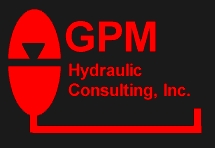
P.O. Box 1376
Monroe, GA 30655
(770) 267-3787
gpm@gpmhydraulic.com
 Al Smiley President |
 Jack Weeks Instructor/Consultant |
 Alan Dellinger Instructor/Consultant |
 Hank Ayers Instructor/Consultant |
 Chris Dellinger Instructor/Consultant |
Robin Haywood Training Coordinator |
For an archive of past newsletters, please visit:
CLICK HERE to send this newsletter to a friend!
"Troubleshooting Hydraulics" Newsletter
www.gpmhydraulic.com
Click Here to view a brief video about our 3-day workshop
In This Issue
1. Using Thermal Imaging for Troubleshooting and Reliability Checks
2. Call GPM for Emergency Hydraulic Troubleshooting
3. Is It Time For A Hydraulic Reliability Assessment At Your Plant?
4. The Difference Between Nominal, Absolute and Beta Ratings
5. Spread the Word! Tell Others About the GPM Newsletter
6. 2013 Hands-On Hydraulic Reliability and Troubleshooting Workshop Schedule
 By Jack Weeks
By Jack Weeks
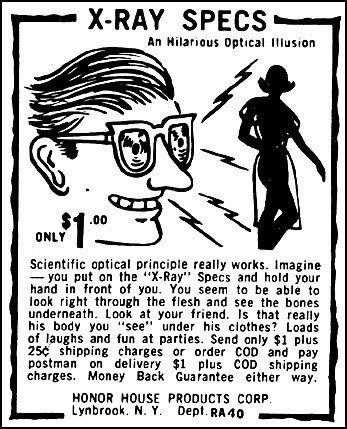
If x-ray glasses DID work, there have been times when they would have come in handy troubleshooting hydraulic machines. Often we are asked to help diagnose a problem or perform reliability assessments, but shutting down a machine that is producing though not operating properly is not an option. It would be nice to don my x-ray glasses and look inside to find the problem, but the next best thing is to use thermal imaging. Those of you who have attended any of our classes know that the first symptom of failure in almost any hydraulic component is sn increase in temperature. Typically, when a component fails, it leaks. Sometimes it leaks onto the floor and the problem is pretty obvious. But more often it leaks internally, or bypasses. The result is an abnormal pressure drop across that component. From our understanding of the Conservation of Energy Law, we know that pressure drops that do not perform useful mechanical work generate heat. So, while we can't see component wear through the $1 x-ray glasses, for a little extra we CAN see changes in temperature by using thermal imaging.
We use a portable infra-red camera for several troubleshooting and reliability checks. For instance, suppose we would like to know if a reservoir needs cleaning. Most reservoirs have screens and baffles that block the view. We would have to risk contaminating a clean reservoir to make a visual inspection. But if there is sludge on the bottom, it will be a different temperature. If two pumps are operating side-by-side in a parallel connection, if one of them is more worn than the other, this will become blatantly obvious when a thermal image is made. Several images over a period of time can expose wear on a single pump. And there are many more checks that are made easier with thermal imaging: checking fluid levels, finding foam or water in the oil, spotting a check valve stuck open on a filter or heat exchanger, catching a ruptured bladder or improper pre-charge on an accumulator, finding turbulent spots in poorly designed system piping - the list goes on and on.
It always surprises me when I visit a plant and discover that they have an infra-red camera but it sits on a shelf gathering dust. From the day we purchased one, wondering if it would justify its cost, we have found one exciting use after another for it.
sludge on the bottom because
it's a different temperature than the oil.
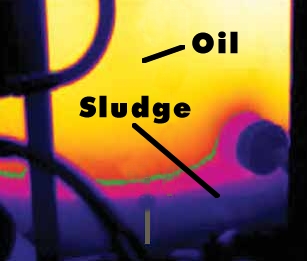
Which is the bad pump?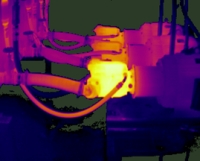
Clearly this filter
is bypassing.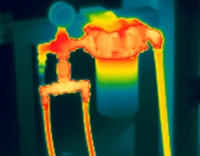
The cooler is doing its job.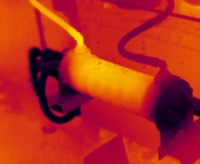
The two accumulators on the
right are overcharged.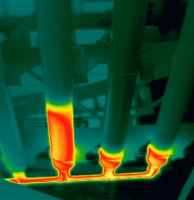
When most companies slow down near the end of the year, we've been full steam ahead here at GPM. Our two new consultant / instructors are working out very well and we look forward to a busy and successful 2013. We've been contracted by one of the largest papermill companies to perform reliability assessments and training at several of their locations so that has kept us on the road and busy here in the office. I recently completed the writing of a troubleshooting manual for an OSB plant in Canada and we hope to be teaching their program in February. In mid-December I drove down to south Mississippi to conduct a hydraulic survey for a plywood plant on their presses and prepresses. I also went on an emergency troubleshooting call from a papermill in Georgia this past Friday on a problem with their digester hydraulics. We're now putting the finishing touches on a a customized manual on a German press for a company near Raleigh, North Carolina. We've recently completed the scheduling of our 2013 Hydraulic Reliability and Troubleshooting workshops to be conducted throughout the country. Looking forward to seeing some old and new customers this year!
Since the last newsletter, I have taught classes in Jackson, TN, Bennettsville, SC, Jacksonville, FL, Corpus Christi, TX and Prosperity, SC. I also spoke at the ExxonMobil Symposium in Charlotte, NC. My focus lately has been on marketing. Some of it is pretty boring - building databases and developing marketing materials for distribution, etc. - but some is pretty exciting, too. I developed and produced a promotional video for our 3-day Hands-On Hydraulic Relieability and Troubleshooting workshops that we will be conducting around the US this year. It's only a few minutes long, but it was a lot of work and a steep learning curve to figure out Adobe AfterEffects for editing it. There's a link to it here on the newsletter, so check it out - a lot of work went into it! But we plan to make a lot mnore of these in the near future, so keep an eye out for them on YouTube and Linkedin.
In 2012 of last year I had the pleasure of being a Key Note Speaker for Exxon-Mobil’s Maintenance Symposium in San Antonio TX., Edmonton Alberta CA, Mexico City Mexico, Ontario CA, Chicago IL and Las Vegas, NV. I also taught several Hydraulic Troubleshooting workshops for paper mills, OSB plants, automotive parts manufacturers, plywood and sawmills across the US and Canada. While occasionally at the GPM Headquarters, I kept myself plenty busy developing customized training manuals for upcoming training events. This was just a few of many backroads my GPM travels carried me to in 2012 and I look forward to the New Year!
It’s been busy around here for the past few months! In mid-December, I was at a sawmill in Alabama teaching a Maintenance Basic Hydraulic Troubleshooting class. I have recently completed the writing and CAD drafting on customized manuals for a paper company in Louisiana, an auto parts manufacturer in North Carolina, and a paper company in Connecticut. I’m looking forward to a busy and productive 2013!
Ingredients
Serves: 4
1 tbsp vegetable oil
1 pound deer stew meat
1 medium onion, sliced into rings
8 ounces Portobello mushrooms
2 (10 ounce) cans cream of mushroom soup
1/2 cup Worcestershire sauce
1 drop Texas Pete(R) hot sauce (or other very hot pepper sauce)
2 cups sour cream
1 pound egg noodles
Preparation method
Prep: 10 mins|Cook: 25 mins
1. Heat 1 tablespoon vegetable oil in Dutch oven. Brown meat in hot oil on both sides. Stir in onion rings and mushrooms; cook until caramelized. Add soup, Worcestershire sauce, and hot sauce.
2. Bring a large pot of salted water to boil for the noodles. Add noodles to water and cook according to package directions. Drain.
3. When water is boiling for the noodles, add sour cream to deer meat mixture and simmer. Serve stroganoff over cooked noodles.
The month of December was an excellent month for me. I had the opportunity the travel to Prosperity, South Carolina and teach a few sections in our Maintenance Basic Hydraulic Troubleshooting Class with Jack Weeks. When I wasn’t on the road I was in the office doing drafting for a number of companies. I have also put together many troubleshooting manuals and developed power point presentations for our advanced training classes. As a fairly new member of this company I have also had the opportunity to meet some really great people and develop strong work relationships with my co-workers. I expect 2013 to be a great year of a lot more learning and building new friendships with people in the world of hydraulics.
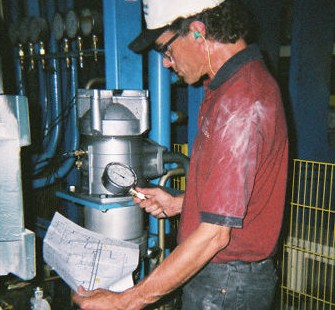
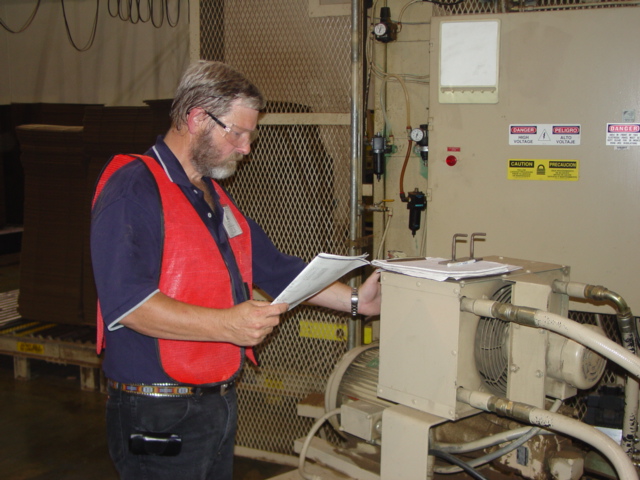
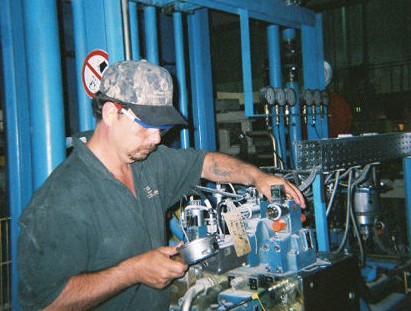
Nothing is more expensive than unscheduled down time. GPM’s customers know they can call whenever they have a troubleshooting issue they simply can’t resolve. With over 50 years experience dealing with hydraulic failures, our consultants have the resources to help troubleshoot whatever hydraulic problem you encounter. Whether you’re experiencing a total system outage, repeated component failure or just need a professionally designed preventive maintenance schedule, the consultants at GPM can help. Call GPM for
In-plant Troubleshooting
Leakage Problems
Pressure Settings
Shock Problems
Preventive Maintenance Scheduling
Hydraulic Troubleshooting Manual Development
Startup Consulting and
Recommendations
Heat Problems
Repeated Component Failures
Speed Problems
Do you want to learn more about how GPM can help you? Go to http://gpmhydraulic.com/troubleshooting.htm
- Testing of the pump(s) to determine if the proper volume is being delivered to the system. By making this test regularly the pump can be replaced on a down day and not when it fails and interrupts production.
- Checking the accumulators to make sure they are properly pre-charged which is necessary to achieve the desired speed to maintain production.
- On any given hydraulic system, there should be some lines that are hot (above 130 degrees), warm (100-130 degrees), and cool or at ambient temperature. By checking the temperature of these lines on a regular basis a component failure can be found before the system fails completely.
- One of the main issues in a hydraulic system is leakage. One drop of oil that drips once per second will lose 405 gallons a year. If leakage is occurring there is a reason for it. Our consultant will identify the cause of the leak and recommend the necessary fix to prevent it from occurring in the future.
- One of the biggest problems in systems today is that the pressures are out of adjustment which causes excessive force, heat, leakage and wasted electrical energy. Our consultant will identify any pressure setting issues and many times correct them during the assessment.
- Check to verify that the pipe and tubing
clamps are properly spaced and are of the proper type.
Make sure that the hoses are properly installed to prevent pre-mature failure and oil loss. - Check the condition of the filters if a visual or electrical indicator is available.
- Verify that the air and water heat exchangers are operating properly to reduce the oil temperature to an acceptable level. If the oil temperature is above 140 degrees then oil will start breaking down causing sludge and varnish in the system.
- Check the condition of the breather cap and recommend a maintenance schedule.
- Sound checks to determine pump cavitation, aeration or valves bypassing in the system.
Schedule a Reliability Assessment at your plant today for a full report on the condition and recommended improvements for your systems. Then by using the customized Reliability and P.M. Schedule, downtime, parts cost and oil loss will be reduced.
The nominal rating really doesn't mean much. At best, it means that a filter with this rating will indeed stop some particles of the given size or greater from going through the element. This is an arbitrary micrometer rating given by the manufacturer of the filter. It doesn't mean that particles greater than the size of the nominal rating won't go through the filter - in fact, often particles many times that size can be pushed through. Discard the nominal rating altogether - it tells us nothing useful about a filter being used for hydraulic oil.
The absolute rating tells us a bit more. Essentially, the absolute rating is the size of the biggest particle that can be forced through the filter. In other words, it is the size of the biggest "hole" in the element. It's better than the nominal rating, but there is no standard for measuring its accuracy - and no accountability for the entity that determines the rating.
The most reliable method of filter rating is the beta rating. The beta rating of a filter is a ratio of the number of particles upstream of a filter vs. the number of partcles downstream of a given size. The standard of measurement is governed by the ISO (International Organization of Standards), an organization of 156 countries that determines standards for everything from thread depths to bank routing numbers worldwide. The measurement is made by using particle counters upstream and downstream of a filter. So the b10 rating of 35 for the filter mentioned above would be determined as shown below:
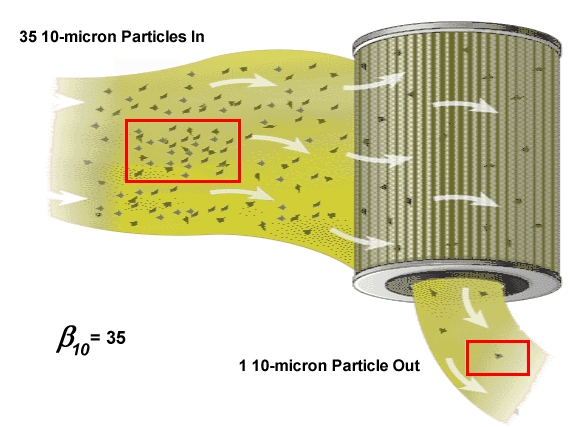
If you've found our newsletter informative and beneficial please click here to tell your co-workers and friends.
2013 Public Workshops:
Hydraulic
Reliability & Troubleshooting Workshop
Hands On
3 Day Course
Cylinder Force & Speed Calculations, Pressure Settings, Hydraulic Pumps, Directional Valves, Check Valves, Pressure Controls, Accumulators, Flow Controls, Hydraulic Motors, Servo & Proportional Valves, Hydrostatic Drives and Fluid Maintenance.
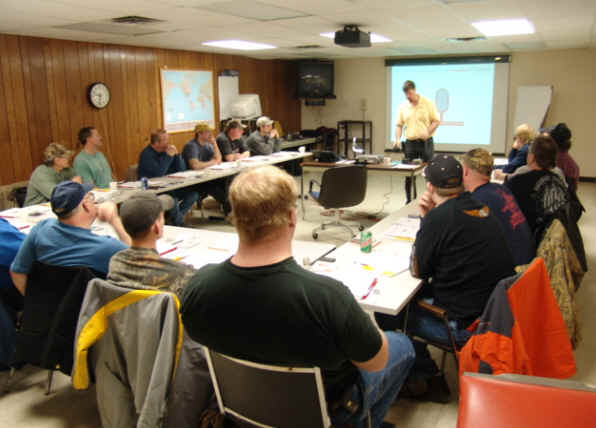
Real World Industrial Style Hydraulic Trainer
Registration Fee $1100
During this economic slow down, we are committed to providing you with the best hands on Maintenance Hydraulic Training at the most affordable cost.
-
While nearly all companies are asking for a registration fee for each student for a three day course, we are making the training more economical, your 3rd student can attend for HALF PRICE!
-
The workshop is not taught by a salesman but by our instructors who have many hundreds of hours of in plant troubleshooting and consulting experience.
-
The workshop is designed specifically for mechanics, electricians and supervisors by GPM's president, Al Smiley. Your students will learn the troubleshooting techniques that he's developed during his 33 years in the hydraulic field.
-
GPM's only business is maintenance hydraulic training and consulting. This means that you WILL NOT get a sales pitch on hydraulic pumps and valves! You WILL get three days of the most intensive hydraulic troubleshooting instruction available anywhere at any price by the most respected and acclaimed instructors in the country!
Not
sure how much your maintenance people know about hydraulic troubleshooting?
Have them take our on line quiz at: http://www.gpmhydraulic.com/quiz.htm
Please contact our Training Coordinator, Robin Haywood at 770-267- 3787, or gpm@gpmhydraulic.com to register or for more information on the workshop.
| 2013 - 3 day Hydraulic Reliability & Troubleshooting Schedule | |
|
Date |
City |
| January 29th – 31st | Spartanburg, SC |
| February 5th –7th | New Bern, NC |
| February 19th – 21st | Cleveland, TN |
| February 19th – 21st | Duluth, MN
(Our Mobile Lab will not be available for this location only. Cutaway pumps and valves will be used for hands on training) |
| February 26th – 28th | Savannah, GA |
| March 5th – 7th | Bossier City, LA |
| March 12th – 14th | Ft. Lauderdale, FL |
| March 19th – 21st | Meridian, MS |
| April 3rd – 5th | Bradford, PA |
| April 8th – 10th | Petersburg, VA |
| April 16th – 18th | Tupelo, AL |
| April 23rd – 25th | Conyers, GA |
| May 1st – 3rd | Springfield, MO |
| May 6th – 8th | Eldorado, AR |
| May 14th – 16th | Summerville, SC |
| May 21st – 23rd | Greensboro, NC |
| August 21st – 23rd | Austin, TX |
| August 26th – 28th | Pensacola, FL |
| September 10th -12th | Vicksburg, MS |
| September 17th – 19th | Decatur, AL |
| October 8th – 10th | Jackson, TN |